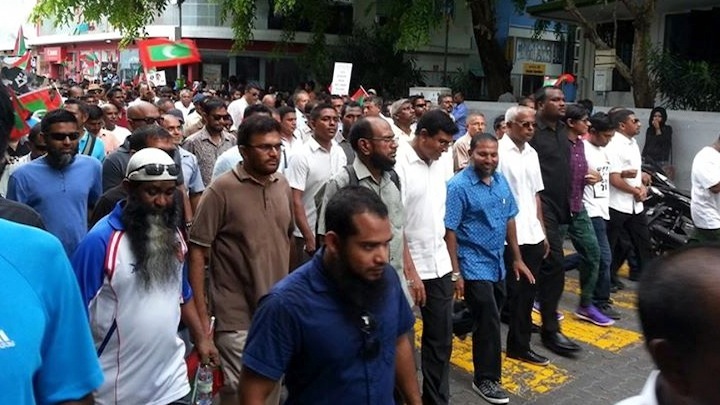Former President Mohamed Nasheed’s legal team has expressed concern that Nasheed is not being given the opportunity to have a fair trial.
At a press briefing held on Wednesday they detailed concerns about the procedural and legal matters around the case against Nasheed, stating much of the proceedings were against both the constitution and the laws of the Maldives.
Nasheed has been currently placed under island arrest, with regard to a case concerning his arrest of Criminal Court Chief Judge Abdulla Mohamed last year.
Hulhumale’ court’s legality in question
Member of Nasheed’s legal team Hisaan Hussain voiced concerns that the Hulhumale’ Magistrate Court, tasked with presiding over the case, was formed unconstitutionally. Quoting Article 141 (a) of the Constitution and Articles 53 (b) and 62 of the Maldives Judicature Act, Hisaan stated that it was clear the Hulhumale’ Magistrate Court was established out of the boundaries of law.
Hassan also noted that there was an existing case in the Supreme Court, where the court had been asked to rule on whether the Hulhumale’ Magistrate Court had been formed in accordance with existing laws. She said that although they did not know who had filed the case, it had been filed prior to the decision to have the court preside over the case against Nasheed. The Supreme Court has not yet made a ruling on the case.
However, an official from the Hulhumale’ Court who did not wish to identify himself said to Minivan News today, “We are not officially aware that such a case regarding this court exists.”
He further said that the Department of Judicial Administration was mandated to provide details on similar issues to the media.
However, Department of Judicial Administration’s Spokesperson Latheefa Gasim said that they did not wish to comment on the issue at this point in time.
Panel of Three
Former Minister of Youth and Sports and member of Nasheed’s legal team, Hassan Latheef stated that the panel of three magistrates which are to preside over the case was selected in violation of Article 67 of the Judicature Act, which specifically outlines how magistrates can be assigned to courts. He said that none of the three magistrates assigned by JSC were appointed to the Hulhumale’ Magistrate Court.
Latheef said that in contrast to international practices, the magistrates for this particular case had been “handpicked from around the country”. According to him, this was in direct violation of the Maldives Judge’s Act.
In addition to this, Hassan revealed that one of the three magistrates assigned by the Judicial Services Commission (JSC) was currently being investigated by the commission on two different offenses, a charge of corruption and of sexual offence.
Latheef further said since the strongest penalty against Nasheed in this case was a 3 year jail sentence, the case could not be considered an offence serious enough to warrant three magistrates to preside over it. He confirmed that this was the first time a case regarding an offence against Article 81 of the Penal Code was being overseen by a panel, rather than a single judge.
The legal team noted that they believed Nasheed was being discriminated against due to his political views. They pointed out that this was in violation of Article 17 of the constitution.
JSC Media Officer Hassan Zaheen spoke to Minivan News today regarding the concerns raised by MDP.
“It is not MDP that gets to decide whether or not a panel needs to be formed. In Islamic Shariah there is nothing to stop us from doing something just because it hasn’t been done before,” he said.
Zaheen further stated that it was constitutional to bring in magistrates from any part of the country to sit on the case and that this was clearly defined in law.
“JSC can bring in judges from anywhere, as long as they are of the same level. It is clearly defined in the Judges Act, or the Judicature Act, or some relevant law. These are all magistrates,” he said.
Zaheen denied that Nasheed was being discriminated against.
“Has another president of Maldives had a criminal case against him? No. Now, if a similar case has not occurred before, there is no room to claim there is discrimination. What are they comparing with?”
Violation of fundamental rights
Nasheed’s legal team expressed concern that the case was being handled outside of all norms.
They pointed out that the Prosecutor General, Human Rights Commission of the Maldives (HRCM) and the Ministry of Gender, Family and Human Rights had so far stayed silent on the matter, although it was within their mandate to protect the rights of the people.
Media Official of the Prosecutor General’s Office Hussain Nashid declined from commenting to the media.
“I will not comment about a case which is in the courts currently. The PG office will make whatever necessary statements during court sessions only.”
HRCM and the Human Rights Ministry were unable to comment on the matter at the time of press.
In January, a group of lawyers had forwarded this same case, concerning the arrest and detention of Criminal Court Chief Judge Abdulla Mohamed to the International Criminal Court.
Likes (1)Dislikes
(1)Dislikes (0)
(0) 